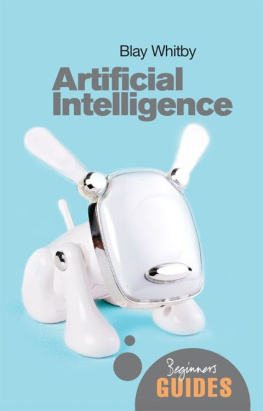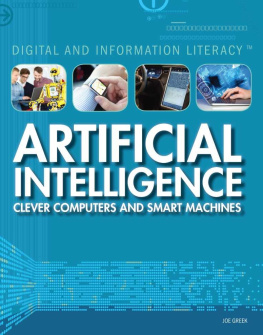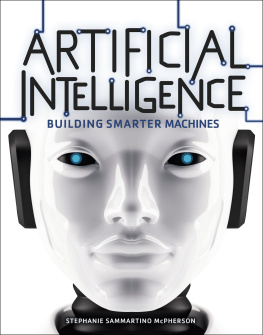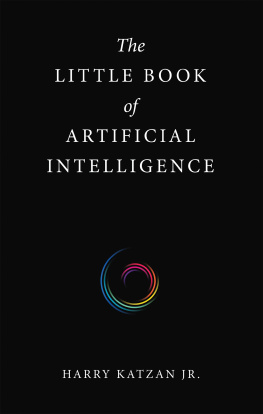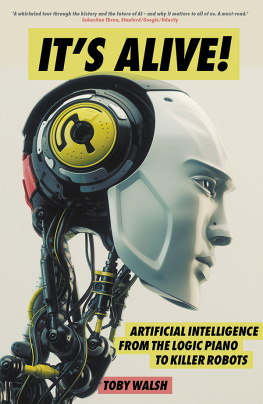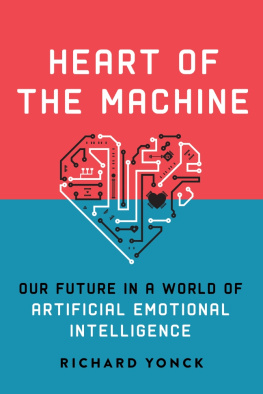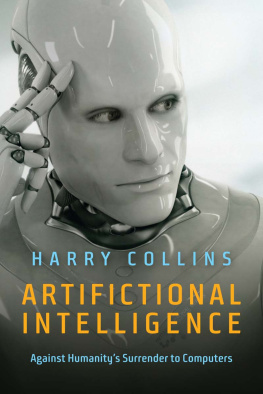Artificial Intelligence
A Beginners Guide
ONEWORLD BEGINNERS GUIDES combine an original, inventive, and engaging approach with expert analysis on subjects ranging from art and history to religion and politics, and everything in between. Innovative and affordable, books in the series are perfect for anyone curious about the way the world works and the big ideas of our time.
aesthetics
africa
anarchism
aquinas
art
artificial intelligence
the bahai faith
the beat generation
biodiversity
bioterror & biowarfare
the brain
british politics
the buddha
cancer
censorship
christianity
civil liberties
classical music
climate change
cloning
cold war
conservation
crimes against humanity
criminal psychology
critical thinking
daoism
democracy
descartes
dyslexia
energy
engineering
the enlightenment
epistemology
evolution
evolutionary psychology
existentialism
fair trade
feminism
forensic science
french literature
french revolution
genetics
global terrorism
hinduism
history of science
humanism
huxley
islamic philosophy
journalism
judaism
lacan
life in the universe
literary theory
machiavelli
mafia & organized crime
magic
marx
medieval philosophy
middle east
NATO
nietzsche
the northern ireland conflict
oil
opera
the palestineisraeli conflict
paul
philosophy of mind
philosophy of religion
philosophy of science
planet earth
postmodernism
psychology
quantum physics
the quran
racism
renaissance art
shakespeare
the small arms trade
the torah
sufism
volcanoes


A Oneworld Book
Published by Oneworld Publications 2003
This ebook edition published 2012
Copyright Blay Whitby 2003
The moral right of Blay Whitby to be identified as the Author of this work has been asserted by him in accordance with the Copyright, Designs and Patents Act 1988
All rights reserved
Copyright under Berne Convention
A CIP record for this title is available from the British Library
ebook ISBN 9781780741291
ISBN 9781851686070
Typeset by Jayvee,Trivandrum, India
Cover design by Two Associates
Oneworld Publications
185 Banbury Road
Oxford
OX2 7AR
England
Stay up to date with the latest books, special offers, and exclusive content from Oneworld with our monthly newsletter
Sign up on our website
www.oneworld-publications.com
For Sharon Wood for introducing me to the field of Artificial Intelligence
Contents
Preface
This book is intended to introduce the reader to the fascinating world of Artificial Intelligence. Like the other titles in the Oneworld series, it presumes no previous knowledge of the area but assumes that both the subject and the excitement around it can be conveyed to a general audience in a non-technical and jargon-free manner.
Artificial Intelligence (normally abbreviated to AI) is one of the most possibly the most exciting challenges that humanity has ever undertaken, although it is hard perhaps to convey excitement within the pages of a relatively serious book. However, the unrestrained gusto with which researchers from the widest possible variety of backgrounds throw themselves into the many diverse challenges of AI makes it a very exciting place to work. Some of the challenges described may, at first glance, seem overambitious but reaching for the stars and ignoring the cynics is characteristic of a young science. I have been writing on AI for twenty years and have no illusions as to just how difficult some of its goals are to attain. However, I consider it an inestimable privilege to have been in the same room as people who, on being told that something was impossible, promptly went out and did it.
AI is not only all about ambitious remote goals: it is also a remarkably successful technology. Much of what was once presented as cutting-edge ideas is now regarded as everyday computing technology. Ex-students and colleagues who have entered the commercial sector have, on occasion, made small fortunes from developing and exploiting AI technologies.
There is no shortage of good books on AI. However, few of them are particularly suited to introduce a beginner to the field. Student texts have to deal with the subject in a more technical manner and fluency with various types of formal notation is usually required.
AI is an extremely diverse area and it would be impossible for this book (or possibly any book) to cover every important piece of research and technology in detail. In order to introduce the general reader to as much of the area as possible I have inevitably had to be selective and to describe some of the technical details rather briefly. The bibliography should allow the curious reader to fill in any missing details.
Because this is a book for the general reader I have refrained from introducing any equations, computer code, logic, or symbolic descriptions. I have also kept scholarly references to a minimal level. In this sense, it is very different from an AI textbook of which there are many excellent examples available. My personal favourites are listed in the further reading sections for the relevant chapters (including this preface) but omission of a title does not imply any criticism.
This book alone, therefore, cannot prepare you for a job in AI. If you are interested in pursuing a career in AI you should, if at all possible, learn some computer programming. This is not because AI researchers spend all their time writing computer programs in fact they tend to spend most of their time thinking about difficult problems it is simply because computer programming is a fundamental skill in this area and the closest thing there is to a lingua franca in AI.
Two myths about AI
There are two particularly pernicious myths about AI which are in general circulation and which this book will comprehensively dismiss. The first myth is the claim that AI has failed. (Some people occasionally make the stronger claim that AI is impossible.) This myth is just plain false. AI has succeeded in producing a steady stream of successful technologies that are changing the way we live. Examples of the successes of AI litter the chapters of this book. There can be little doubt that the activities of AI researchers will continue to spin off useful everyday technologies. AI has also succeeded in producing a large number of important ideas and methods that have spectacularly influenced other areas of science and art.
Why such a myth might persist probably lies in a misperception of the goals of AI. It is easy to become confused about these goals since AI has and always has had multiple goals ranging from making computers easier to use, to understanding human thought. There have always been those who expressed cynicism about AI both inside and outside the field. Fluidity of goals and methods is typical of, and probably helpful to, an area of science that is still very young.
The second myth is the notion that AI, when it succeeds, will leave humanity in a state of serfdom to a new race of all-powerful machines. This second myth is not merely false: it is also nonsensical. It must be admitted that some of the responsibility for the introduction of this myth lies with certain individuals within AI. Even so, it makes no sense. There is nothing in present-day or foreseeable AI that is likely to bring about this dystopian prospect. AI has, so far, proved to be a remarkably benign technology. There is, as with all technologies, a balance of costs and benefits which we will consider in detail. However, AI compares very favourably with many other technologies of the second half of the twentieth century in this respect.
Next page
